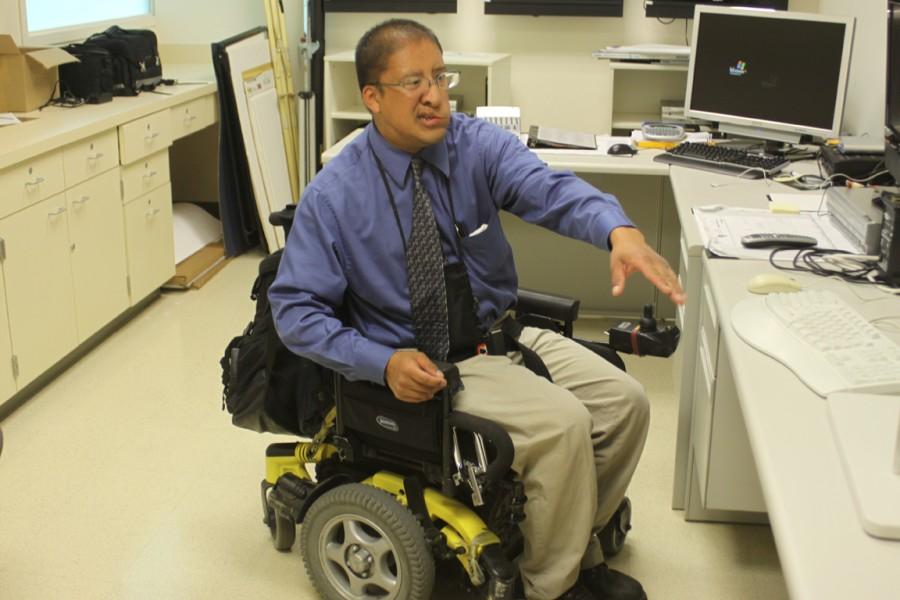Many people aren’t aware of the difficulties disabled students go through every day, but the GCC staff is leveling the playing field to give those students the resources to reach their goals.
“On average, every year we serve about 800 to 1,000 students who have different types of disabilities,” said Tina Anderson-Wahlberg, the interim program manager of Disabled Students Programs and Services.
GCC student Jorge Acevedo was shot in the spine shortly after passing his police academy exam. He lost his ability to walk, and because of the expenses, became a student at GCC instead of returning to Cal State Northridge. Through his criminal justice professor, GCC Chief of Police Gary Montecuello, Acevedo found his calling and started working for the Glendale Police Department.
Along with helping mobility impaired students, GCC also aids students with visual and hearing impairments. “The counselors want us to succeed,” said Acevedo. “They help us reach our goals.”
When students with any type of disability first come to the college, they have to go to the Disabled Students Programs and Services (DSPS) department and ask for services.
“We can’t go out and recruit. They need to request our services,” said Anderson-Wahlberg. “They have to bring a verification of their disability. Either a doctor’s note or for students who’ve done testing, we need to see the results.”
The students then fill out an application for the DSPS and meet with a counselor to talk about potential challenges. Based on this meeting, the counselor is able to refer students to different places on campus, as well as services, which might help.
One of these services is Mobility Orientation for visually impaired students. This helps students find their way around campus. There are also yellow bumps on the ground around GCC for visually impaired students who use a white cane.
Anderson-Wahlberg said that when working with blind students, the first thing the department needs to know is whether they can use the computer.
There also is a screen-reading program on campus called Job Access with Speech (JAWS). If a student is familiar with the program, then the counselor will refer the student to the High Tech Center for Students With Disabilities. At this center, the student will meet with the high tech specialist who will see what the student knows about the program.
For example, if a student has a multiple choice test for a history class, DSPS can provide help.
“We would get the test from the instructor in Microsoft Word format and the student then uses JAWS to read the test,” said Anderson-Wahlberg. “Then one of the team members will fill the scantron to take to the instructor.”
Jessica Stewart is visually impaired, and she has found JAWS extremely helpful, especially because she hasn’t been trained to read Braille.“We’re able to navigate the computer like a sighted person does,” said Stewart. “You’re able to compose word documents and navigate certain parts of the Internet. The only drawback to JAWS is that certain web pages might be inaccessible PDF files and it won’t be able to read the symbols correctly.”
The school also makes things easier for mobility-impaired students. The students are able to access everywhere on campus, but there is room for improvement, according to Anderson-Wahlberg.
“One of the places we can improve on is our elevators. They’re getting old and sometimes they break down,” Anderson-Wahlberg said.
Acevedo said that he gets around campus easily, and he has even joined GCC’s soccer wheelchair team, the Glendale Rough Riders.
Like Acevedo, Ava Fayaz is mobility impaired. Fayaz, 23, has been in a wheelchair since she was 6 years old. She’s able to get to class quickly by using ramps and handicap routes, but there are some things she would change
as well.
“A thing that I found was odd was that in order to get to the second floor of the administration building there is only one elevator in the area,” Fayaz said. “I have a night class on the other side of the building and it takes me a while to go to the elevator all the way on the other side and be able to get to class on time.”
DSPS also aids students with hearing impairments. These students are assigned interpreters based on whether or not they can sign. If they don’t sign, then GCC has a Real Time Captionist, who uses a program to type everything that is said in class for the students to read.
Most people don’t take a second glance at the disabled students at GCC, but with the help of counselors and advanced programs, the student’s goals are getting bigger and their voices are getting louder.

